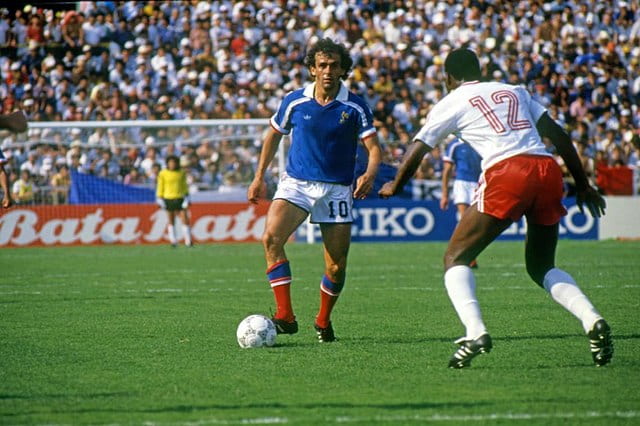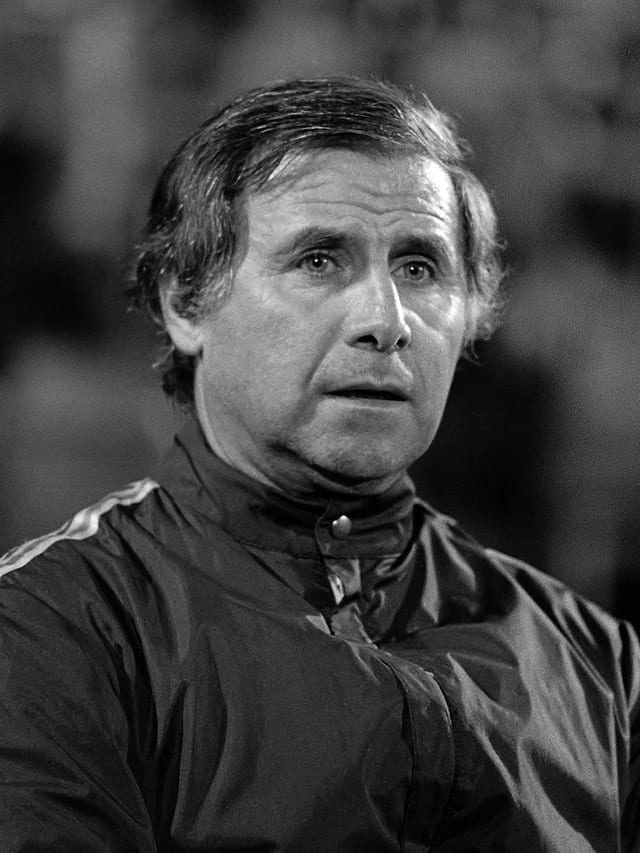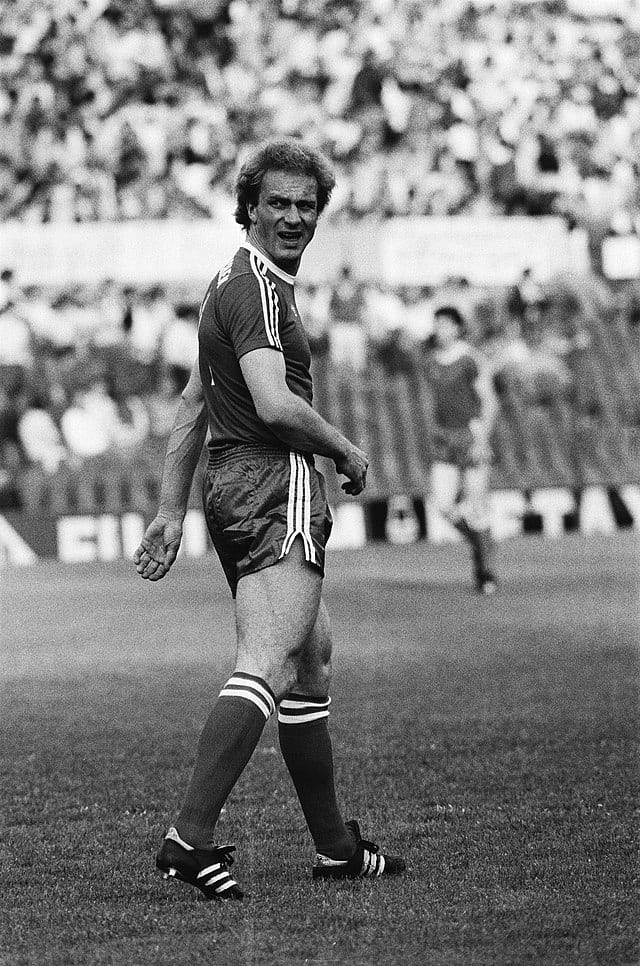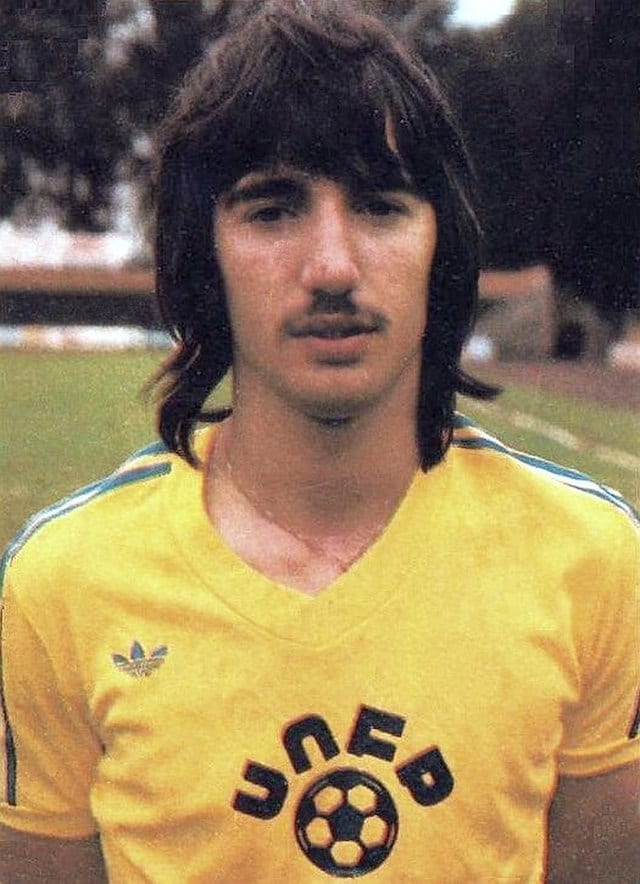by Laurent Bellaiche
To start with this article, it is imperative to listen to the opening lyrics of the Beatles song “Michelle.” It goes as (with the English translation within parentheses):
Michelle, ma belle [My beautiful Michelle]
These are words that go together well
My Michelle
Michelle, ma belle [My beautiful Michelle]
Sont les mots qui vont très bien ensemble [Are the words that go very well together]
Très bien ensemble [Very well together]
I love you, I love you, I love you
That’s all I want to say
When applied to soccer, however, these lyrics should have been slightly changed. To know how, one needs to recall the meeting and association of one remarkable coach, Michel Hidalgo, and one extraordinary player, Michel Platini.
Let’s go back to March 27, 1976. Michel Hidalgo had just been nominated to be coach of the French National team, which had been at the bottom of the soccer world since 1960. In fact, after the brilliant World Cup of 1958, where France finished third thanks to the brilliant Raymond Kopa (elected Golden Ball that year) and the prolific Justo Fontaine (with 13 goals at this World Cup, which is a record that will probably never be broken), France finished fourth in the 1960 European competition organized at home and then endured defeat after defeat and failed to qualify for major tournaments. France, the founder of the European and World Cup competitions, did not qualify for either the 1964, 1968, 1972 and 1976 Euros or the 1962, 1970 and 1974 world cups. The only exception was participation at the 1966 World Cup, where France finished last in its group after a draw to Mexico and two losses against Uruguay and England. Another humiliation was the 1-0 defeat in Strasbourg against Norway, a small soccer country at that time, in November 1968 during the 1970 World Cup’s qualification.
Michel Hidalgo therefore faced a major challenge in March 1976 in trying to make France a force in the world of football again . For that, he decided to call on three players for for his first game as the national coach. One was Didier Six who was 21-years-old, played for Valenciennes and a gifted left-winger. The other two were 20-years old: Maxime Bossis a defender from Nantes, , and Michel Platini, a promising playmaker from Nancy in Lorraine. Platini had first tried to play for Metz, a club from Lorraine but fainted during a breathing test on a spirometer. Doctors said that Platini could never play at a professional level. In fact, he would become the best player of the world, and the ensuing collaboration between Hidalgo and Platini would last eight years until June 1984.
But back to the first game of Hidalgo and Platini on March 27, 1976. It was in Paris for a friendly game against the mighty Czechoslovakia who would be crowned champion of Europe a couple of months later. France scored the first goal at the 17th minute by Gérard Soler, and then an important moment in French football’s history occurred at the 73rd minute. There was a free kick for Les Bleus but it was indirect. In other words, a player could not directly kick the ball towards the Czechoslovak goal net. The 20-year-old Platini went to the experienced 28-year-old French Captain, Henri Michel, and told him the following words: “Pass the ball to me and I will score’’. That is precisely what happened. It was Platini’s first goal out of his 41 (national record at that time) for France. It was his first free kick among his 11 victorious ones for France, which is still the record by far. The Czechoslovaks came back and tied the game 2-2 in five minutes between the 78th and 83rd minutes, but this was a promising debut for the two Michels, Hidalgo and Platini.
One enormous test then happened on February 23, 1977. The Ogre was visiting Paris, with West Germany facing France in Parc des Princes for a friendly game too. West Germany was the 1972 European champion, the 1974 World Cup Champion and was only defeated on penalty kicks by Czechoslovakia (with the famous penalty from Panenka) in the final of the 1976 Euro. Every single player in the German team was a celebrated star in his club. The goalkeeper was Sepp Maier, nicknamed the Cat and one of the best ever. The central-back and captain was Franz Beckenbauer, winner of the 1972 and 1976 Golden Balls and coined Der Kaiser. One forward was Karl-Heinz Rummenigge, who will then win two Golden Balls too (in 1980 and 1981). For this prestigious game, Hidalgo did the unthinkable: he called four players for the first time, one of them being Patrick Battiston. Hidalgo was not afraid to make neophytes face the world champion, as long as Platini was on the field. France won 1-0 thanks to a solid game by Platini and a goal from his Nancy teammate, Olivier Rouyer. Hidalgo was creating a new mentality for the French team and many people wondered how far France could go if they beat the world champion. Under his guidance and with Platini at the helm of the team on the field, France accomplished many feats during friendly games, which resulted in the nickname ‘’World Champion of friendly games’’ for France. For instance, France went to South America in the summer of 1977 and came back with two draws: one 0-0 against Argentina who would become world champions a year later and the other one by 2-2 against the powerhouse Brazil. Another important friendly game happened in Naples in February 1978 against the Italy of the legendary goalkeeper, Dino Zoff. This match was very special to Platini because he was of Italian descent. After 22 minutes, Graziani scored twice, and Italy led 2-0. The score was then reduced to 2-1 after a header of Dominique Bathenay. At the 63rd minute, there was a free kick for France and Platini put the ball in the back of the net. However, the goal was disallowed because Platini kicked the ball before the Referee whistled. Les Bleus gained another free kick at the 81st minute, and Platini scored again; this time the goal being allowed. It was at that time that Italy began to pay a close attention to Platini, by wondering what level can be reached by this 22-year-old who has made the net shaking twice against the great Dino Zoff. Platini was not done with the country of his parents since he also had a tally during the historic win of France by 2-0 against Italy on February 1982. It was historic because it was the first time since 1920 that France triumphed against Italy.
This match rendered Juventus desperate to acquire Michel Platini. He then joined that Italian team in the summer of 1982 and would stay there until his retirement in 1987, after having played for Saint-Etienne between 1979 and 1982 and Nancy between 1972 and 1979. Platini explained his progression by stating that he first played in the best team from Lorraine (Nancy, probably to make fun of the Metz’s administration), then the best French club (Les Verts of Saint-Etienne) and then the best team in the world (Juventus). Platini is still a hero of Juventus, having individually won his three Golden Balls there during the years where he was also the Serie A’s top goal scorer (1983, 1984 and 1985), as well as two Italian championships, two European Cups and one Intercontinental Cup with this famous club from Torino.
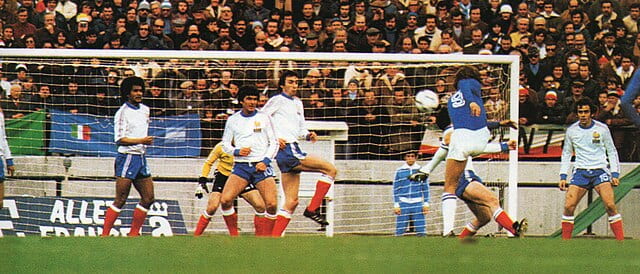
The French national teams playing against Italy in the 1978 World Cup. At the centre, Frenchmen Gérard Janvion, Jean-Marc Guillou and Maxime Bossis attempt to contrast the shot while on the far right Michel Platini watches.
Other historic moments occurred in friendly games for the France of Platini and Hidalgo.The first ever win against Brazil in April 1978, with a 1-0 victory with a goal coming, of course, from Michel Platini. But what about games for qualifying for major competitions and during these latter competitions? Les Bleus absolutely needed to win against Bulgaria in Paris in November 1977 to take part of the 1978 World Cup in Argentina. They did 3-1, with the second French goal from Platini. The 1978 expedition in South America was, however, a little bit disappointing. France lost its first two games by 2-1 against Italy and Argentina (with Platini making the net shake there), and only defeated Hungary 3-1 in the third game while being already eliminated. This deception was probably the reason why France did not qualify to the 1980 European championship because of a draw at home against Sweden just a few months after the end of the 1978 World Cup.
Like the game against Bulgaria in 1977, France had to beat the Netherlands in November 1981 to hope of qualifying for the 1982 World Cup in neighboring Spain. The Dutch team has played, but lost, the last two World Cup finals against the home country, West Germany in 1974 and Argentina in 1978. It was thus a strong team and its goalkeeper, Van Breukelen, was excellent. Once again, Hidalgo surprised everyone in this game. It was customary at that time to play with three midfielders, one being defensive in nature (usually wearing the number 6), another being the playmaker and being offensive (having the number 10 ) and the last one being a compromise between defensive and offensive, with such player being the number 8. For that crucial game. Hidalgo decided to have a midfield formed by three technically gifted players who all played number 10 in their club: Platini, of course, but also Alain Giresse from Bordeaux and Bernard Genghini from Sochaux. This stroke of genius was a success, with France winning 2-0 and Platini scoring again (the first goal) from a free kick.
It was now time to go and play the 1982 World Cup. It did not start well, with a defeat against England by 3 to 1. On the other hand, the second game was a walk in the park with a thrashing of Kuwait by 4-1. The first French goal was made by Bernard Genghini while the next three ones came from the three players that Hidalgo called for the first time for his first game as coach in 1976 against Czechoslovakia: Michel Platini, Didier Six and Maxime Bossis (for what would be his unique tally under the French jersey). This was a nice way to say “Thank you, Boss.” Alain Giresse scored another goal, but Cheikh Fahd of Kuwait came into the field and asked his team to leave the game because a whistle was heard (which did not originate from the Referee) before Giresse’s action. Incredibly, the Soviet Referee disallowed the goal, at the great fury of Michel Hidalgo – who was usually a person with a great calming presence.
The third game of the group stage was a reunion with Czechoslovakia and was nerve breaking. France could not afford to lose, to go to the second round. Didier Six put Les Bleus on the right path with a tally at the 66th minute but Panenka equalized 20 minutes later with a penalty kick. In the dying moments of the game, the Frenchman and 20-year-old Manuel Amoros deflected a ball that was going into the French net, with his head on the goal line. France qualified by the skin of its teeth. The first match of the second stage was against Austria but Platini was injured. Consequently, Hidalgo decided to play with a new midfield with Jean Tigana, Alain Giresse and Bernard Genghini. This latter scored the unique goal of the game thanks to a fantastic free kick, and France played rather well. An intense debate was therefore going on among the over 50 million-French population with the return of Platini for the next game against Northern Ireland. Who was not going to play in the midfield? Was it Tigana who had the best physical capacity? Was it Genghini who had a phenomenal left foot? Was it Giresse who saw everything before everyone? Could it even be Platini, himself, who could score countless goals and delivered precise passes from 50 yards. So many people were waiting to know what the choice of Hidalgo would be. And what happened? Another stroke of genius that nobody saw coming: Hidalgo let go of his usual tactics of three midfielders and three forwards and decided to try for a novel strategy of four midfielders and two forwards. Tigana, Genghini, Giresse and Platini will all be playing together in the midfield! This was the creation of what is now known in the history of football as Le Carré Magique [the magic square]. With such incredible square, France played a beautiful game and won 4-1, with two goals from Giresse (including one from a header, while he measures 5 feet 4) and two from the attacking Dominique Rocheteau, who was nicknamed the Green Angel when he played for Saint-Etienne.
The new tactics of Hidalgo was a huge success and West Germany was afraid of the French team before the semi-final of the 1982 World Cup. That game in Seville is a classic of soccer and worthy of a Greek tragedy. The German Littbarski scored first. Platini equalized by a penalty. At the 50th minute, the German goalkeeper Schumacher very strongly collided with Patrick Battiston, who collapsed on the field and was unconscious. Platini checked on his friend and felt no pulse. He believed that Battiston has just died and did not let go of his hand while Battiston was carried off the field on a stretcher, to be delivered oxygen and to be brought to the closest hospital. Battiston had two missing teeth, three cracked ribs and a damaged vertebra. Genghini took the spot of Battiston on the field and the French team was fired up for what they believed was a vicious attack by Schumacher, and for which the referee did not even issue a yellow card. During extra-time, France put the ball in the net twice by Marius Trésor and then Alain Giresse, with only 21 minutes left to play. However, West Germany came back and equalized via two goals from Rummenigge and Klaus Fischer. Penalty kicks would decide if the drama. Didier Six and Maxime Bossis, while having played well, missed theirs and France was out of the World Cup final after a game dubbed in France as the tragedy of Seville. The French team also lost the game for the third place against Poland while West Germany was defeated by Italy in the final.
After such a dramatic World Cup, Hidalgo made another adjustment to the team. In a February 1984 match against England, he decided to substitute Bernard Genghini by another midfielder, Luis Fernandez. This was the second version of le Carré Magique; this one being even more equilibrated with two players overseeing defensive tasks, Fernandez and Tigana, and the two others having free reins to show their rare, combined intelligence for offensive actions, Giresse and Platini. This Tigana-Fernandez-Giresse-Platini quartet is often considered by soccer experts as the greatest midfield of all time. With them, France easily beat England by 2-0, with two goals of Platini, and was ready to tackle the task of becoming European champion for the first time during the 1984 European competition organized on home soil, with Platini as team captain and Hidalgo as the architect.
However, France encountered many problems during the first game of this Euro against an excellent team of Denmark, rightly called the Danish Dynamite due to its strength. Platini scored the unique goal of the game at the 78th minute but Manuel Amoros received a red card at the 87th minute for headbutting Jesper Olsen. This important French defender was banned from the competition until the final if France succeeded to reach it. How was Hidalgo going to replace Amoros for the next game against the “cousins’’ of Belgium? He found an interesting solution: Luis Fernandez would play as the right-back defender and the midfield will be made by the first version of the magic square, Tigana-Genghini-Giresse-Platini. We are now talking about a wonderful pentagon! France played that day a football that is so deserving of the name French flair, and overwhelmed Belgium by 5-0, with a goal from Fernandez, another one from Giresse and an incredible hat-trick from Platini with the left foot, the right foot (on a penalty) and a header. Strikingly, Platini realized again such complete hat-trick in the next match against Yugoslavia for a 3-2 victory; with the caveat being the penalty with the right foot being replaced by a free kick with such foot. The next match is another great moment of soccer and occurred at Marseille. It was the semi-final against Portugal who played much better than expected. The defender Jean-François Domergue put France ahead, but Jordão equalized for Portugal. This latter even scored his second goal of the night during extra-time, but Domergue then did the same for France. Only one minute left to play the game that seemed to be destined for penalty kicks. However, Jean Tigana did not want to live another tragedy, like the one of Seville against West Germany two years before. The former postman gathered his last strength and decided not to ride a bike, like some postmen do in France to deliver mails, but rather to fly like the eagle he was. He pierced the entire right wing of the Portugal defense and delivered a cross to Michel Platini. However, the ball arrived not in front but rather behind Platini. This latter thus first controlled the ball, turned around and kicked the ball that finished at the back of the net. The stadium exploded! The country exploded! For the first time in its 80-year existence, France was going to play the final of a major tournament.
This final against Spain was the last game with Michel Hidalgo as the national team’s coach. Luis Fernandez, who was born in Spain, was constantly harassed by the Spanish players who told him that he was a traitor, to which he answered by kissing the French jersey. At the 57th minute, there was a free kick from France. And who else to take it, except the great Michel Platini? It was well kicked except that it directly arrived at the hands of the Spanish goalkeeper, Arconada. But this latter made a terrible mistake, and the ball went through his legs and continued its path into the net. Platini had scored his 9th goal of the tournament in five games (which is still a record for any Euro) and France was leading 1-0, which then became 2-0 with a goal by Bruno Bellone at the last minute. France won and was on top of Europe for the first time ever! Two events symbolizing the spirit of this group also happened during that game. First, Battiston pretended to be injured and asked to be taken out of the field so that Amoros could enter and be among the winners. Secondly, some French players carried Hidalgo, gave him the cup, and went around the stadium. The mage needed to be acknowledged. The crowd had to bow in front of one of its two kings; the other being Platini.
After this victorious Euro, Hidalgo then went to help Marseille becoming one of the top clubs in Europe while Platini continued to play for France for three more years with Henri Michel (to whom he asked to pass the ball to score its first goal in 1976) as coach. During these last three years, France won against Uruguay the 1985 Artemio Franchi trophy opposing the European and South American winners and finished third at the 1986 World Cup after two other phenomenal games where Platini scored again, against Italy in the round of 16 and Brazil in the quarter final. But, as in 1982, France was eliminated by West Germany in the semi-final.
The success of France at the 1984 European competition was the one that opened the door to many others that followed suit, such as the 1984 Olympic games, the 1998 and 2018 World Cups, the 2000 Euro, the 2001 and 2003 FIFA Confederation Cups, the 2021 UEFA Nations League, the 1988 UEFA European Under-21 Championship, the 2001 FIFA Under-17 World Championship and the 2013 FIFA Under-20 World Cup. Michel Hidalgo passed away in March 2020, and, when learning about his death, Michel Platini said:
I personally keep the memory of a gentle, pedagogical, and sincerely humanist gentleman. Michel Hidalgo was exemplary of humanity combining the benevolence of the educator with the affection of a father. He gently protected me, allowed me to flourish on the field and was one of those who allowed me to become the player I have become. Michel, as coach, took the French team to the top of his game, making the choice of the beautiful game with determination and allowing each of us to express all our individual qualities and talents. Michel Hidalgo leaves a considerable legacy to the France team. He rebuilt French football at international level. His vision and his work still vibrate today in all the matches of our national team.
It is now time to conclude this article and indicate what “Michelle” should have been:
Michel et Michel, mes beaux [Michel and Michel, my two beautiful]
These are coach and player who go together well
My Michels
Michel et Michel, mes beaux [Michel and Michel, my two beautiful]
Sont deux sportifs qui vont très bien ensemble [Are two sportsmen who go very well together]
Très bien ensemble [Very well together]
I love you, I love you, I love you
That’s all I want to say
Laurent Bellaiche is a Distinguished Professor in the Physics Department and Institute for Nanoscience and Engineering, as well as the Twenty-First Century Endowed Professor in Optics, Nanoscience and Science Education (for more details, please see: ccmp.uark.edu). His favorite team is Paris Saint-Germain, especially that of the first trophies (French Cups) in the 1980’s, with the three Dominique’s (Baratelli, Bathenay and Rocheteau) and two jewels (Safet Susic and Mustapha Dahleb). His two favorite male football players of all time are Diego Armando Maradona and Robby Rensenbrink. His current three favorite female players are Grace Geyoro, Melchie Dumornay and, of course, Sophia Smith. His favorite soccer/football quote is one from Bill Shankly, “Some people think football is a matter of life and death – I assure you, it’s much more important than that.”

